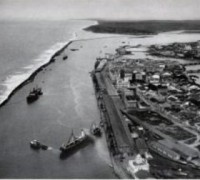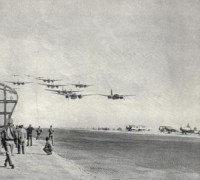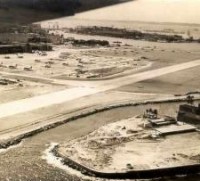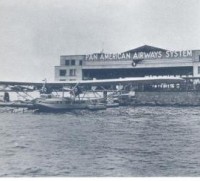BRAZIL THE FORGOTTEN ALLY - BRAZIL X USA
3)BRAZIL STRATEGIC VISION 1930
WHAT DID YOU DO IN THE WAR ZE CARIOCA?
By Frank Mc D. Cann. University of New Hampshire.
It would be easy to suppose that Brazil of the 1930s was so poor and unorganized that it was simply pushed hither and yon by the powerful international currents of the decade; that its leaders merely responded to external forces and demands, and did not have a firm grasp on the country's relative capabilities vis-a-vis neighbors and distant powers. Such an assumption would be wrong. After the regime and military collapse that occurred during the Revolution of 1930, the federal government headed by Getúlio Dornelles Vargas reorganized the national political structure and rebuilt the federal army.
A summary of this document will give the reader some insight into the strategic thinking of the Brazilian leadership and suggests that, for all the apparent internal divisions among the élites, Brazilian policy ultimately was based on a coherent and realistic appraisal of the country's relative strength and position in South America and in the world.
The analysts observed that the great powers were shaken by internal economic and social crises that had unsettled the world order and had produced a "reciprocal and permanent distrust (italics sic) that made any durable agreement impossible." As a result, "Brazil as an ally could be pulled into another world war, or it could be the cause or theater of a war... In fact, over South America in general and over Brazil in particular there loom serious threats, because various expansionist currents (italics sic)..." converge here, among which are:
The Japanese - the most dangerous, because it is the most systematic and methodical, the most absorbent and best directed; The Germanic - existed before the European conflagration [WWI] and which threat broke out again with the wave of intensive racist spirit (italics sic) and scientific-military philosophy;
The North American - that is above all economic, not threatening directly our political independence, but tending to make us vassals. American expansion, that is done principally by means of the exportation of capital and via commerce in general (italics sic), tends to clash here with the Japanese, that is carried out by the export of labor, whose effect is more radical and dangerous. The collision of those two currents could result in an attack against our independence or, at least, against our integrity;
The Italian - that by its origins and nature is less dangerous, has accumulated, however, too much in certain regions of the country, tending indirectly to threaten a break in the national unity of the people, and to exercise strong influence on part of public opinion in event of a European war." The German immigrants could similarly endanger national unity and resolve. In case of an "extra continental" (italics sic) war, Brazil could only defend itself with a preventative policy.
Internally, it would have to control the immigrant population, spreading it throughout the country to avoid concentrations of those with the same origins, neutralizing direct assistance from foreign governments, forbidding foreign colonization companies, insisting on obligatory teaching and use of Portuguese, and imposing an "intense nationalization" (italics sic) of those born in Brazil to cut their ties to the countries of origin. Externally, Brazil would have to make alliances. No one South American country, the general staff analysts noted, in the next two or three decades, would have sufficient military strength to fend off a great power aggressor.
lf the bigger South American countries allied, they would have enough military power to make "difficult, expensive, and dubious, attempts at conquest by any method (italics sic)." This idealized South American alliance should involve development of military industries and a continental system of communications. Alas, the analysts lamented, the history of South American disputes and rivalries made such an alliance unlikely.
The authors reminded their superiors that Brazil, as the only Portuguese- speaking country in the hemisphere, was isolated and so could only count on itself. Although the United States was similarly alone vis-a-vis the Spanish- speaking countries and although their commonality as outsiders had led to a "more or less intimate cooperation" in the past, expanded United States influence would not be "without grave inconveniences".
"Economically we are their dependents, because they buy our principal product in much greater quantities than all other countries, while we buy relatively little from them." Furthermore, coffee was not a necessity and in wartime it could be obtained elsewhere. The United States, the report warned, "could itself constitute a threat for us... depending on the evolution of its post-war international policy".
All this meant that Brazil had to organize its military power, which would "liberate it from North American dependence (italics sic), without prejudicing an even greater closeness (aproximapdo) with the great confederation of the north, thereby satisfying, in broader fashion, the necessities of national defense." The analysis warned that, in case of war, "without the aid of the United States or of another strong industrial power, the situation of any South American nation is precarious, because none of them possesses sufficient military industries". And, in the meantime, as Brazil developed its industrial capabilities, its defense against extra-continental aggression, lay in "preventative measures" (sic), principally diplomacy.
If a new war followed the pattern of the great war of 1914- 18, "our position is naturally on the side of the Entente, especially if Argentina and the United States line up on that side." However, the report cautioned that Brazil "should not assume an attitude diametrically opposed to that of Argentina, which could cause a war with that nation, and for which we are not prepared".
This threat analysis shows that as early as 1934, Brazilian authorities were measuring the dangges that were accumulating on the world scene and were carefully considering how best to protect the country. In summary, the Brazilian leaders believed that they had to depend on their own wits and resources, and that they should use the crises that lay ahead to obtain the greatest advantage for Brazil. However, when considering a possible world war and the problem of equipping and preparing its armed forces, the Brazilian military and presidential papers repeatedly point to the United States as logical source.
There were also domestic reasons for wanting to build up federal military power. The Revolution of 1930 had pushed aside the oligarchic, state-based coalitions that had controlled the political system since the late 1890s, but the danger of a rising of remnants of the old system was always latent. And new threats based on foreign models and inspiration appeared as the decade wore on. In 1932, the Sáo Paulo élite led that state into a these-month rebellion; in 1935, a Moscow-directed communist uprising held Natal for a few days, and in 1936-37, greenshirted fascist-inspired Integralistas marched and fought with leftists in the streets.
In order to contain such internal threats, the central government wanted its military forces strengthened. Only then, proponents argued, would the corrosive political problems be checked and the work of national development carried forward. The military and presidential archives hold documents that discussed these problems and their solutions. Eventually, the major political solution would be the November 1937 internal government coup that suppressed the 1934 constitution, closed the congress, and established the Estado Novo dictatorship that ruled Brazil until October 1945.
The foregoing analysis should be sufficient to indicate that the Brazilian leadership prior to the war had linked national development and security with international trade and finance, and that they were concerned with not taking steps that would endanger the country, but that internationally they saw themselves naturally on the side of the liberal powers, particularly the United States. Further, there was agreement among key leaders that the dangges that afflicted the world also offered opportunities. Factions developed as the world crisis deepened and opinions differed as to which side offered the most with the least danger. For some observers, the internal debates took on ideological coloring that muddied analysis.
As part of that process, it organized its first modern military intelligence service during 1933-34. Brazil sent military attaches to various "interesting countries." An early result of this effort was a detailed study of Brazil's "military situation," which would provide a basis for the military and foreign policies in the years prior to World War II.



